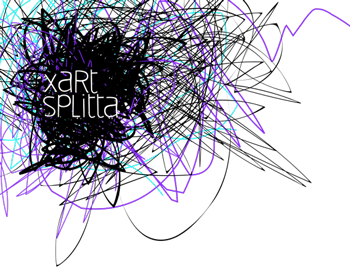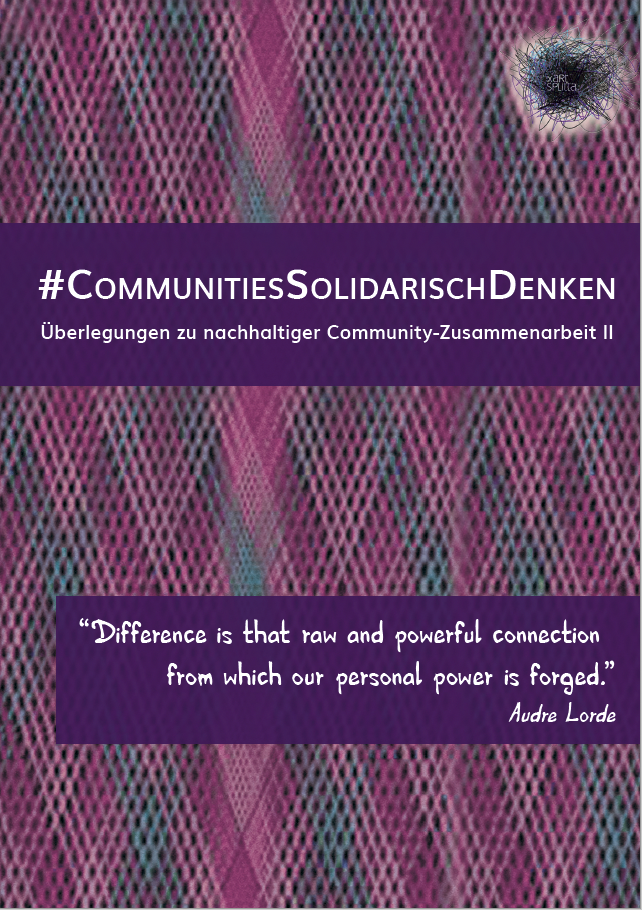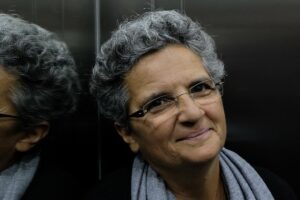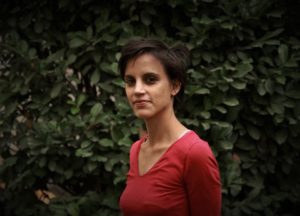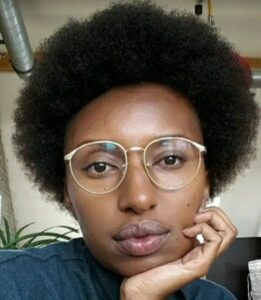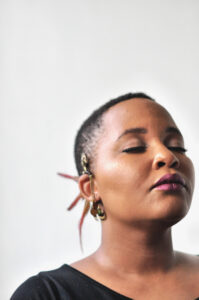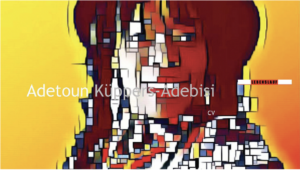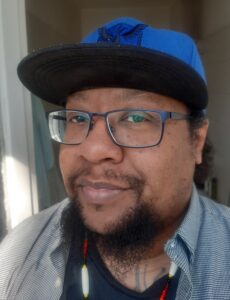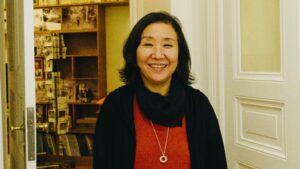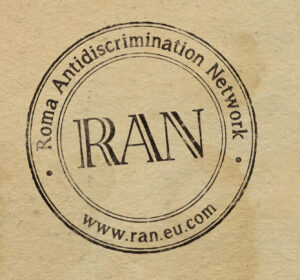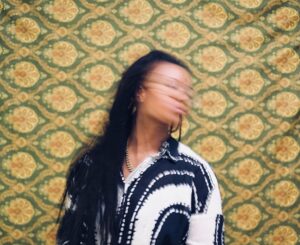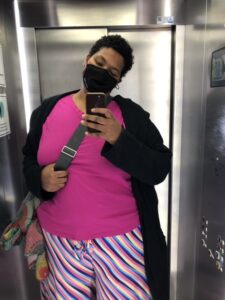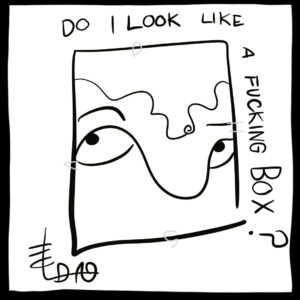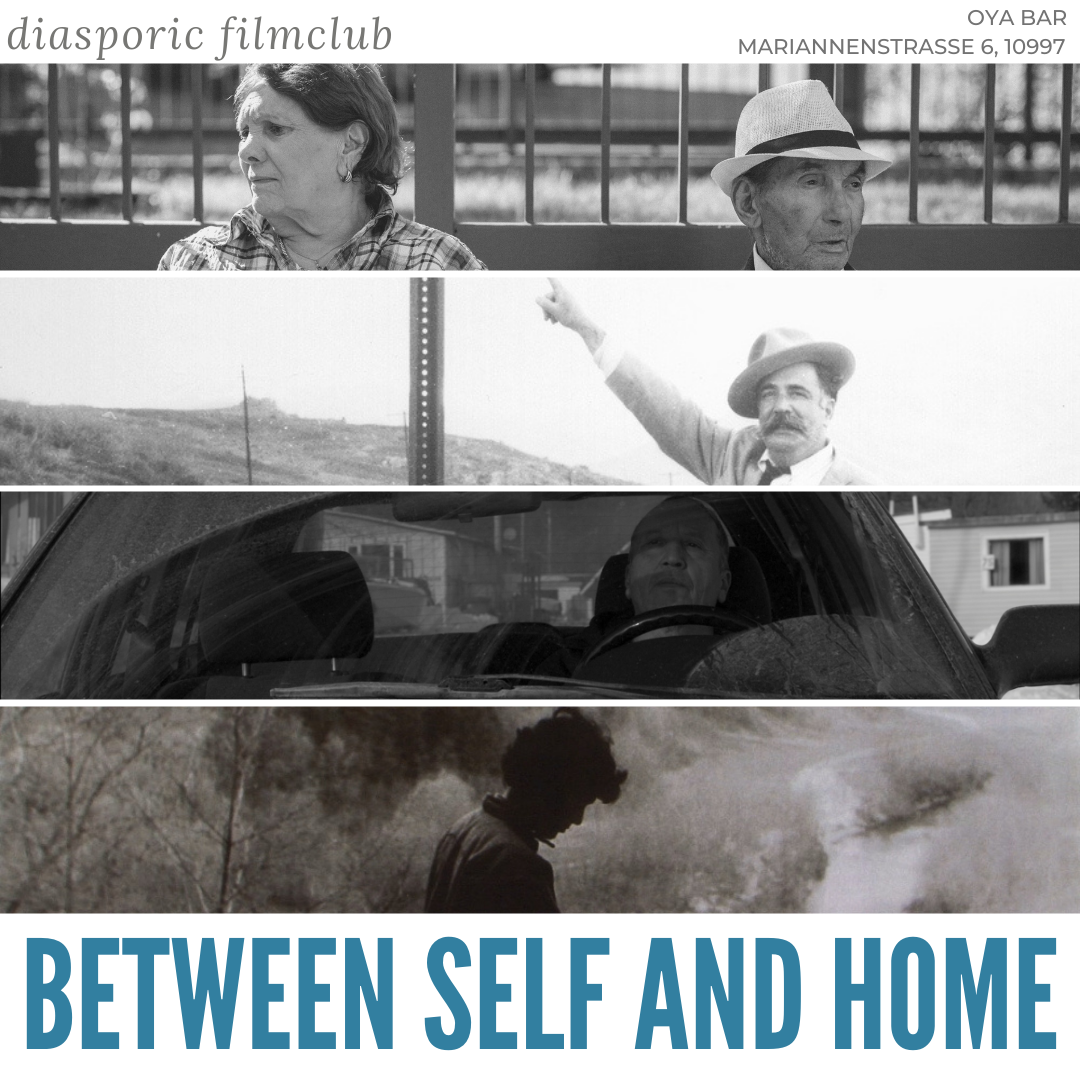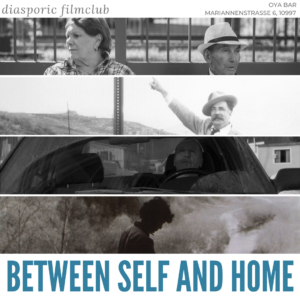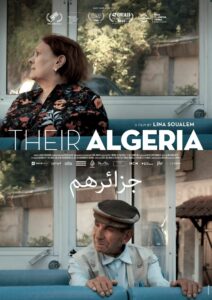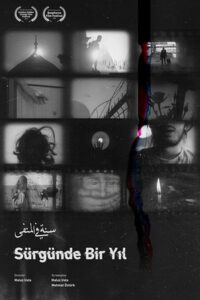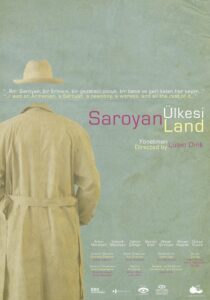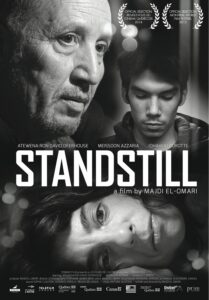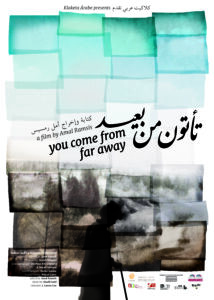September 15th – October 06th, every Thursday, 7pm
at OYA BAR
(Mariannenstrasse 6, 10997 Berlin)
For those deracinated subalterns, “home” has become “another country”. Losing home is not only losing a material shelter or geographical place but above all it means losing a social world in which your life was previously shaped. That created new generations whose cultural aspirations and references are inevitably different from those of their parents and ancestors.
The film program consists of films on our roots that are no longer in their original soil. Stories that sometimes become an ode to or a quest towards our lost homelands.
Where is home? What does ‘homeland’ mean for us?
The diasporic filmclub “Between Self and Home” is a cooperation with POC Art Collective, curated by Nahed Awwad and Necati Sönmez and OYA BAR Kreuzberg.
Together we invite you to watch, share stories and have discussions around these essential questions of what and where home is, sometimes accompanied by the filmmakers.
Program
Necati Sönmez works as a film critic, curator and filmmaker. He is the initiator of Which Human Rights? Film Festival and one of the founders of the Documentarist Film Festival, which soon became the most important documentary film festival in Turkey. He has been a jury member at over thirty festivals and curated various documentary film programs.
Nahed Awwad is an independent Palestinian filmmaker and film curator based in Berlin. She has worked in films and television since 1997. Nahed received her diploma from the European Film College in Denmark and has since released eight films, e.g. “25km”, “Going for Ride?”, “5 minutes from home”, “Gaza Calling”.
Nahed Awwad and Necati Sönmez are a part of the POC Art Collective.
POC Art is an art collective based in Berlin consist of artists and curators who emphasise the art of People of Color. POC Art aims at organizing cultural events such as film screenings, concerts, talks, and workshops. An earlier event was a series of film screening and concerts under the title of “Music Beyond Borders”
OYA BAR is a queer-feminist Collective, running the Bar space at Schokofabrik in Kreuzberg, Berlin. It’s aim is to provide a Café, Bar, community place as well as home and safer space especially for queer BIPOCs.
Let’s continue to take care of each other!
Feel free to test yourself before coming and wear mask if possible.
September 15th, 7pm
Their Algeria by Lina Soualem
2020, 73 minutes, Algeria
Spoken languages: French and Arabic, English subtitles
After 62 years of marriage, Lina’s grandparents, Aïcha and Mabrouk, separate. They came from Algeria to France 60 years ago. Side by side, they experienced a chaotic immigrant life. Their separation is an opportunity to question their journey of exile.
Lina Soualem
French-Palestinian-Algerian filmmaker and actress, born and based in Paris. After studying History and Political Science at La Sorbonne University, she started working in journalism and as a programmer in film festivals, looking to combine her interests for cinema and the study of contemporary Arab societies. Lina worked as a programmer for several film festivals. Her debut film “Their Algeria” premiered in Visions du Réel International Film Festival.
September 22nd, 7pm
A Year in Exile by Malaz Usta
2020, 19 minutes, Turkey/Syria
Spoken languages: Arabic, English subtitles
An immigrant’s first year in a metropolitan city outside his small country. Through a collection of moving images and sounds the film exhibits what he faces, the pictures that he sees, the crowded thoughts in his head, and the state of emotional shock that he lives in.
Malaz Usta
Damascus born Malaz Usta moved to Turkey in the beginning of 2016. In 2014 he started working as a graphic designer and film editor. In 2018 he started studying Radio, TV, and Cinema at the Faculty of Communication in Marmara University. He is also continuing his double major studies in Film Design at the Faculty of Fine Arts.
Saroyanland by Lusin Dink
2012, 72 minutes, Turkey
Spoken languages: Turkish and Armenian, English subtitles
In the year 1964, famous author William Saroyan took a journey to his birthplace in Bitlis, located in historic Armenia. This docu-drama traces the actual path of that journey and aims to understand Saroyan’s unique attitude to belonging, witnessing the self-discovery of a man who followed the traces of his Armenian ancestors.
Lusin Dink
After graduating from Istanbul Bilgi University’s Cinema-TV Department, Dink began her career as assistant director. She has worked for about ten years in many national and international productions and shot her first feature docu-drama SaroyanLand in 2012 which has premiered at Istanbul Film Festival. The film did its international premiere at Locarno Film Festival the same year and screened in over 20 national and international film festivals, winning the Best Balkan Film Award in Sofia and Best Documentary Award in Yerevan.
September 29th, 7pm
Stand Still by Majdi El-Omari
2013, 104 minutes, Canada
Spoken languages: English
After the political crisis in Kanesatake’s reserve, Arihote, a Kanienkehaka “Mohawk”, sometime war photographer, and his wife parted ways. While trying to help his son who has committed a misdemeanor, Arihote happens upon the revenge killing of a neighbor by Wedad, a Palestinian refugee. Loath to get involved in a police investigation, Arihote finds himself helping Wedad to leave the crime scene. Arihote finally begins to rebuild his relationship with his son, and to focus on resolving his feelings about both his wife’s departure and his father’s suicide.
Majdi El-Omari
After working in the Middle East as an assistant director and production manager on various feature and documentary films, El-Omari became a filmmaker, scriptwriter, producer and editor. El-Omari’s short films d’auteur have been selected in several international festivals. “Standstill” was his debut feature film. El-Omari lives in between Haifa and Montreal now is writing his next feature film while teaching fiction filmmaking in Dar al-Kalima University in Bethlehem.
October 6th, 7pm
You Come From Far Away by Amal Ramsis
2018, 84 minutes, Egypt
Spoken languages: Russian, Spanish and Arabic, English subtitles
Imagine that your father is a Palestinian Arab, and he had fought against Franco in the Spanish Civil War. Imagine that you have siblings, and you cannot talk to them because you do not speak the same language. Imagine that you have a family, but you were raised without parents… This cinematographic journey reveals the extraordinary story of the family of Najati Sidki, a Palestinian brigadist who took part in the Spanish Civil War, and finds out how the Palestinian identity faces the turmoil imposed by the numerous exiles.
Amal Ramsis
Amal Ramsis is an Egyptian filmmaker who was born and raised in Cairo. She has studied cinema in Madrid between 2002-2005. She has conducted numerous workshops around the world with women who have no experience in filmmaking at all. Ramsis is the founder and the director of Cairo International Women’s Film Festival. Her films “Only Dreams” (2005) “Life” (2008), “Forbidden” (2011) and “The Trace of the Butterfly” (2014) have got several international awards and been screened in many festivals.
This event takes place within the LADS funded project #CommunitiesSolidarischDenken.
